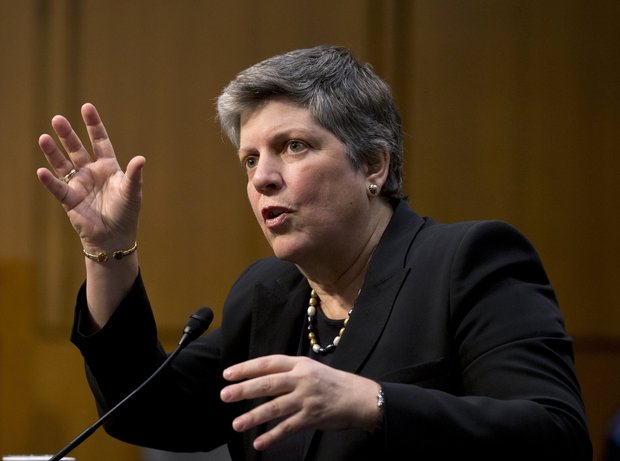Editorial: Will Napolitano perpetuate UC’s bloated pay?

J. SCOTT APPLEWHITE — Associated Press
As the University of California Board of Regents votes Thursday on a new president, Californians should watch the compensation package.
This is one area where nominee Janet Napolitano, now secretary of U.S. Homeland Security, can make a big difference.
As an outsider to academia with a long career in public service – beginning with her Truman Scholarship in 1977 – Napolitano understands public service pay.
She earned $95,000 a year as governor of Arizona and earns $199,700 a year as a U.S. Cabinet secretary. She was among five Cabinet secretaries who volunteered to take a 5 percent pay cut this year after across-the-board “sequestration” spending cuts took effect March 1.
Napolitano and the regents can make a clean break with the incestuous market basket survey among public and private universities, where every administrative move sends salaries ever higher in the stratosphere.
Though Napolitano would come into the UC presidency without a record as a scholar or campus administrator, she could garner immediate respect within the university community and among Californians if she accepted a total compensation package that would still be significantly more than she has received in public service – but considerably less than current UC President Mark Yudof.
He came in with respect for his record as a constitutional scholar and university administrator. But his tenure was marred from the beginning by an excessive compensation package valued at more than $828,000 in the 2008-09 year that he started – an annual base salary of $591,084, automobile allowance of $8,916, supplemental pension funding of $228,000, plus university-provided housing and the usual health and retirement benefits.
That sent the message that instead of resisting excessive compensation trends in the for-profit private sector – with huge disparities between the highest- and lowest-paid employees – the University of California would mirror them. Napolitano can put a stop to that.
She could send a strong message throughout the world of higher education, with her own compensation package as an example, that pay at a public university should reflect public purposes – including the public expectation that our public universities should enrich the state as a whole, not a privileged few in the echelon of administrators.
She’d then be in a good position to rein in administrative bloat.
UC today has more than 9,000 senior administrators – an ever-wider mix of associate and assistant vice presidents, deans and directors – compared with 5,400 a decade ago. UC now has more senior administrators than full-time, tenure-track faculty – whose ranks have flattened at 8,500. In the mid-1990s, UC had two times as many faculty as senior administrators.
Napolitano’s nomination provides a prime opportunity to bring the number of administrators and their salaries in line with a public service ethos.
There is precedent for this. Last year, the incoming chancellor of the California State University’s 23-campus system requested 10 percent less than the $421,500 a year (plus a $30,000 supplement from CSU foundations) that his predecessor received – taking a $380,000 salary (plus $30,000 supplement from CSU foundations).
Napolitano and UC regents will have to do much more than a 10 percent gesture to bring UC executive compensation down to earth, to signal a new era and build public trust among Californians.
[Source]: The Fresno Bee


